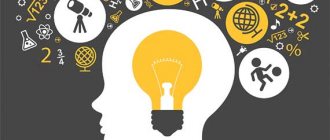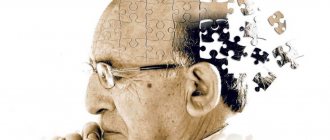Auditory memory is one of the types of figurative memory. First, a person hears a certain sound, which is processed and stored in the brain as an association. From an early age, the involuntary type of auditory memory predominates in people. At the same time, the loudest, brightest and most pleasant sounds are remembered. The voluntary type of memorization develops a little later; to improve it, you need to talk with the child, sing simple songs together, and act out scenes from fairy tales.
Why do you need to develop auditory memory?
Many parents are familiar with the situation when they have to repeat the same request or task to their child several times. Mom and dad think that the child is lazy, does not want to learn or help, they reproach him and even punish him. But in fact, this happens not because the child doesn’t want to, but because he simply cannot understand what they want from him, he has very weak auditory perception, he hears, but cannot comprehend what was said or remember. It turns out that the child has hearing, but does not have the ability to process what he hears.
Such children often fall behind in their studies, spend more time solving the same task, and sometimes leave it completely unsolved, later explaining that they did not understand the condition or question. A meager vocabulary is also a sign of undeveloped auditory memory, as well as the inability to concentrate in a noisy room and to identify the most important thing for oneself from a stream of words. In high school, problems will certainly arise with presentations and essays, most humanities subjects, where the main focus is on lecture-based reading of the material.
Children with poor auditory memory are not difficult to identify.
- They are inattentive.
- They have trouble remembering even basic poems.
- They can't concentrate.
- They don’t remember their parents’ phone numbers, often even their addresses.
- They have difficulty expressing themselves, and even have difficulty voicing rules that have been memorized without understanding.
Children whose auditory memory is well developed are amazed by their ability to reproduce everything they hear in different places, remember news, fairy tales, they speak coherently and beautifully, diluting the story with comparisons and related events.
Short term, but so necessary
Schoolchildren and people who have long matured have short-term memory. Its purpose is the primary processing of information for its understanding. It takes just a few seconds to accept what you hear, quickly analyze it, extract what you need, and send this “harvest” of sounds to long-term semantic storage.
This type of auditory memory is especially in demand by children. After all, they study the world, meet new concepts every day, expand their horizons and vocabulary, learn logic and memorization.
What prevents recognition and memorization from hearing?
- Absent-mindedness;
- Lack of interest in the subject;
- Illness, physiological memory problems;
- Weak or unclear audio signals.
Try to weed out these interferences and practice with your child the simplest techniques for strengthening different subtypes of auditory memory.
So, let's take a closer look at this question: how to develop auditory memory? And we’ll talk separately about how to do this for children and adults.
Exercises to develop auditory memory
Fortunately, memory is an ability of human nature that can and should be worked with and developed. It is better if you start doing this from a very tender age. Songs, lullabies, poems, jokes, sayings, comments on actions, pouring into the baby from close lips, will serve an excellent service in the future. It is possible that his first word will be not just one word, but a whole bunch of phrases.
Repetition is the mother of learning. This wisdom is perfect for describing memory training methods in which the most important thing is regularity. Going through a familiar algorithm every day - counting the steps in the entrance, various rituals established in the family, repeating favorite stories - will give a good impetus to developing abilities.
There are quite a lot of exercises - simple but effective - that will help train various types of auditory memory, and in particular. They will be very useful for all family members, not just children, so for greater results, play and work together.
- What silence says. Try listening to silence, which is very rare in cities. Together with your child, try to isolate its individual components from the general cacophony of sounds - a truck is driving by, a neighbor is knocking with a hammer, there are birds fighting over a piece of cracker, a dog is barking, etc.
- We learn by heart. Anything: go to the store, let the child memorize the shopping list, to congratulate his beloved aunt or grandmother, excerpts from fairy tales, names of flowers growing in the garden, poetry and prose.
- We increase the amount of memory. Another old game when you need to add something of your own to some list. For example, the mother says: “We are going to the sea and take this suitcase, I will put ... a book in it,” then the child picks it up, repeats verbatim everything that the mother said and adds something of his own to the “suitcase.” The more players there are, the more interesting it is, each player repeats what the previous one said and makes his “contribution” to the bottomless suitcase.
- I am a writer. Imagine and make up stories. Today one, tomorrow another, then try to connect them together with the help of some heroes and events. This could simply be a description of a trip to the store, and then the process of making soup. Or a walk at the zoo, and then what will I become when I grow up.
- Dedicate your free time to listening and discussing audiobooks. Various - artistic, popular science, then discuss, express your hypotheses. You can stop listening to the book a little and invite your child to finish the story as he sees it, and then compare it with the original.
- We learn words. Voice 8-10 words to your child, any, at first these can only be the names of objects, and as you practice, dilute them with verbs and adjectives. Ask him to repeat the ones he remembers, and repeat those that he missed again and arrange a control check after some time - an hour or two.
- Association game. This game is often practiced by teachers in primary schools. Prepare pictures depicting different objects, mechanisms, animals, products. Lay it out in front of the child and say a few words that are logically related to the pictures - workshop, zoo, store, restaurant, etc. Ask your child to choose a suitable picture for each word and repeat the word itself and what is pictured for it.
- Find a pair. Make up pairs of words related to each other: vegetable garden - tomato, car - wheel, album - felt-tip pens. Read them to the child, and then name them, only the first word, and the child must name the paired word from memory.
- Coloring from memory. Take the most common coloring books and a set of pencils of six, and later more colors. Tell your child which element of the picture to paint with which color and let him do it from memory.
- Tricky texts. Select or compose texts that contain descriptions and enumerations. Length 8-10 sentences. And then tell your child the task: “I read the text, and you remember all the animals that will be found in it.” By the way, the fairy tale “Kolobok” is ideal for such a task. You read it, and let the child name everyone who wanted to eat Kolobok. You can also select texts with numbers, names of sweets, colors. The main thing is that, against the backdrop of a mass of words, the child can identify and remember those that correspond to the task. The number of words to memorize needs to be changed - start with two or three, then four, five and so on, the text is longer - there are more words.
- Game of "Stop". Choose an unfamiliar book for your child, not an adult book, of course, fairy tales, an age-appropriate encyclopedia, a collection of poems. Take one sentence from the middle of the text and read it out loud, the child’s task is to remember and repeat. If you don't succeed the first time, try again. When you succeed, read a short passage that includes the selected sentence. The child should say “Stop” as soon as you start reading it.
The exercises are quite interesting and not boring, and most importantly, despite their simplicity, they are effective!
For the elderly
Memory training with the help of special exercises is also necessary for older people. By improving it, they maintain clarity and sharpness of mind longer, and also prevent the development of diseases associated with the aging process, impaired cerebral circulation and a decrease in intellectual load.
After 50 years, psychologists recommend spending at least 30 minutes a day on memory development exercises.
"Big surprise"
The point of this exercise is to perform daily actions that a person has never mastered before. For example, today, devote 2-3 hours to understanding the patterns for crocheting lace doilies and even making several stitches. Tomorrow learn 10-20 words in Turkish. The day after tomorrow try to write a poem. That is, there is no need to set a task, for example, to fully learn how to work with a jigsaw on wood. Once you have mastered a few movements, move on to another activity. This exercise develops many parts of the brain because it forces its cells to regenerate while mastering new skills. Including memory.
"Down with the notes"
It is no secret that older people often use lists so as not to forget anything: what they need to buy in a store or pharmacy, what time to take medications, addresses and names of relatives, friends and acquaintances. An exercise to develop memory is to gradually discard these notes, learning them by heart. There is no need to try to remember all the contacts from your phone book in one day. Set aside a specific time period for this - 3 days or a week. Then move on to the next list, and don’t forget to remember this one regularly.
"Back at the desk"
An excellent exercise that is suitable for developing memory in the elderly (after 70). If failures begin, there is no need to do something difficult that will only take away your strength. Suffice it to remember the school curriculum. The training consists of saying out loud the entire alphabet from A to Z twice a day in a calm atmosphere at a leisurely pace. The written version should be kept somewhere nearby so that you can spy on it if something happens (or have someone nearby prompt you). As soon as you manage to reproduce it all without error, the next level of difficulty of the task is to speak it just as slowly in reverse order.
On the importance of correctly setting a memorization goal
Auditory memory is too broad a concept. It, of course, is capable of generalizing and simplifying a person’s life, but it does not take into account a huge number of aspects. For example, the fact that depending on the tasks a person performs, the potential of auditory memory may differ. For example, if someone is used to listening to audiobooks, they will better absorb semantic information through the auditory channel.
If he is a musician with many years of experience, then he can perfectly remember long pieces of melodies the first time and reproduce them, but at the same time he is terrible at listening to audiobooks and lectures (if he has not simultaneously trained this ability, even unconsciously).
First you need to decide on the task for which auditory memory is developing. The following classification of goals can be given.
- By type of activity: listening to music, learning English (developing the ability to understand what is said in a foreign language and memorize new lexical and phonemic constructs), perceiving semantic information through hearing (listening to lectures and audio books).
- According to the final result: recognition (for example, passive vocabulary of a foreign language), reproduction (retelling a text or song).
- In terms of reproduction accuracy: exact, approximate.
Specific actions depend on the task. Let's look at each of these classifications in more detail.
Depending on the fidelity
If accurate reproduction of information is required, then the only method is repeated repetition. Moreover, this is not necessarily cramming (although this method is also effective over long periods) of the necessary material (an anecdote heard on TV), but also repeated reproduction of information with its logical and emotional comprehension.
For example, you can accurately reproduce a joke only by rehearsing it many times. But at the same time you can add your emotions, your facial expressions. In general, approach learning creatively. This will increase the effectiveness of your learning, and you will be able to reproduce the joke more accurately.
In some cases, it is not necessary to reproduce the material exactly; it is enough to convey the key points. For example, you need to briefly retell the lecture. There is no need to quote the teacher verbatim, you just need to be able to tell what he talked about and what new things he learned.
In such cases, you need to try to logically process the material and pack it into a plan, and then remember it, which can be done with mnemonics - a set of techniques that make it easier to remember important information, based on the characteristics of the brain.
Depending on the required final result
The final result is of two types - recognition and reproduction. If you need to feel the same music well and clearly understand where the other person is out of tune and where not, then you need to listen to the melody many times. The same applies to other types of auditory information.
But you won't be able to reproduce it. This is why there are so many brilliant pianists who sing terribly. Why? Because they didn't learn how to play a melody. No matter how many times they listen to it, it will still be of no use. They have a brilliant musical memory, but they will not learn to sing until they begin to try to reproduce the melody with their voice themselves.
To develop auditory memory for reproducing information, you need to train to restore it, nothing else. And you can do it mentally. In sports there is such a thing as ideomotor training. This is when a person imagines in his head how he performs exercises, and his results improve in real training.
In the case of music, you need to start by hitting one note. Then do all the same exercises from the solfeggio course, but not for recognition (say, for example, what triad), but for reproduction (sing it). At first, you can sing along with the source (if you want to develop musical memory, be sure to learn to play the piano, this skill will help a lot, even if your goal is vocals), and then try from memory.
You can check how correctly you reproduced it using a tuner. It can be purchased or downloaded as an application on any smartphone. It will tell you what note you are singing and display any errors.
The same is true with other types of auditory information. If you want to skillfully tell jokes you heard on TV, reproduce them from memory as many times as necessary to make them bounce off your teeth. The secret formula is the more, the better. That is, if you have told a joke a hundred times, and will tell it a hundred more, learn not only to blindly reproduce it, but also to come up with your own jokes based on this one. They themselves will be born in the right situation, you will see.
Considering that it is for the reproduction of information that people want to train auditory memory, then the task must be set accordingly.
Depending on the type of activity
Everything is simple here - you need to decide on the area in which you will develop and study it in more detail. For example, musical memory is well trained by solfeggio, a discipline that studies the structure of music.
In general, the development of memory (not just auditory) in any area comes down to discovering the key elements that are characteristic of it, studying them in very detail, and then using them to remember something more complex.
For example, with the same music, such key elements are intervals, triads, scales, and so on. If you know what the simpler parts of the information you're remembering sound like, you won't have to learn them when listening to a melody. All music is made up of intervals, and you just need to remember the sequence of intervals, not the individual notes. Agree, the task is simpler and faster.
But nothing helps as much as practice and completing specific tasks. You need to remember the melody - listen to it until you know it perfectly. As professionalism grows, musical memory will develop by itself, and in geometric progression. You need to remember the contents of the lecture - listen to other people more often, listen to audio books in your free time. This will train the auditory perception channel. In addition, mnemonics are a good help when listening to lectures, but we will talk about them later.
In general, do not forget the law of the transformation of quantity into quality. The more times you listen to something, the more firmly it will stick in your head. You can train your auditory memory by listening to the same material over and over again. After a while, the other one will be easier to remember, you’ll see. The main thing is to score a sufficient number of times.









